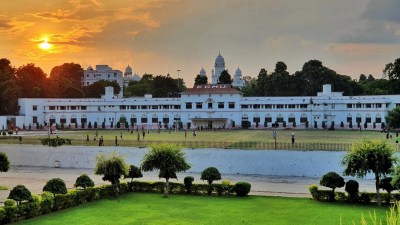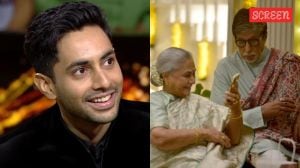Lonely paper chase
During my six-year stint in the Rajya Sabha, I requested the government many times to publish the Henderson-Brooks report on the 1962 India-...

During my six-year stint in the Rajya Sabha, I requested the government many times to publish the Henderson-Brooks report on the 1962 India-China war. The refusal was firm and consistent. Once, in a reply to my question in Parliament, Defence Minister George Fernandes said that it was not in the 8216;8216;public interest8217;8217; to disclose the contents of the report. Recently, however, he said he was willing to table it in Parliament. It is a welcome change.
Whether this change was provoked by the controversy over the government8217;s refusal to share the CVC report on defence deals with the Public Accounts Committee is not so relevant. Fernandes probably wants to consult the Congress before releasing the report. Why should he? The Congress would be least bothered if some military officers were found wanting. They deserved to be exposed.
The sensitive part might, however, be the portion relating to the then prime minister, Jawaharlal Nehru. If he was at fault, let it be known. Much is made of his remark about throwing out the Chinese occupying Indian territory. If one were to tally the date of the Chinese invasion with Nehru8217;s remark, one would conclude that preparations for the attack on India had started long before he said anything.
General P.N. Thapar, the then army chief, was reluctant to engage the Chinese. He told me in an interview in July 1970 that it would have been like 8216;8216;disturbing a hornet8217;s nest8217;8217;. He had also pointed out in a note soon after taking over in 1960 that army equipment was in such bad shape and in such short supply that China or Pakistan could easily defeat India. Why was he pushed? Who pushed him 8212; Nehru or the then defence minister, Krishna Menon? The Henderson-Brooks report might throw some light on these questions.
Lt Gen Balmukund Kaul was a favourite of Nehru and Menon. When the then home minister, Lal Bahadur Shastri, visited Tezpur, Lt Gen Harbaksh Singh was officiating because Kaul was on leave. When Shastri shook hands with Harbaksh, he said: 8216;8216;Commander, are you hopeful you will now halt the Chinese?8217;8217; Singh replied: 8216;8216;Hopeful? I am confident.8217;8217; That evening Shastri heard in Calcutta that Lt Gen Kaul was back at his post. He remarked: 8216;8216;I wish Gen Harbaksh Singh had been kept on. He looked every inch a solider.8217;8217; The release of the report may set many rumours at rest. Lots of things are being attributed to political leaders and the army headquarters. Even if the report proves controversial, it must be published. It is the only authentic document we have on the India-China war.
By keeping the report secret, every rule governing archives has been violated. Under the law, the government cannot withhold such documents beyond 35 years. In the case of the Henderson-Brooks report, as many as 40 years have gone by. Of course, the government can take the cover of 8216;8216;public interest8217;8217; as it did while denying me information on the report. The excuse of public interest cannot be used as a pretext to hold back official reports. This can be challenged in a court of law. A public interest litigation in this case may be the correct step if the defence minister does not keep his word.
The Henderson-Brooks report should make the government take the archives more seriously than it does. Official papers provide a wealth of information not only for scholars but for anyone seeking to assess the turn of events. Democratic governments like the US and the UK take pride in the fact that they make top secret papers public even before the stipulated 30 years. The wrongs of the Vietnam War would not have come to light if the American government had taken shelter behind the exigencies of 8216;8216;public interest8217;8217;.
Archives in India still do not have any worthwhile paper on the transfer of power in 1947. The British government, on the other hand, has declassified a series of volumes in its possession. The last volume came out nearly six years ago. Our archives are a source of frustration for every academician because they offer very little on recent history. But what can any archives official do when no ministry 8212; home, defence or external affairs 8212; transfers any meaningful papers to the archives? Ministers and their officials do not realise that they can be hauled up for violating the law.
Fortunately, private papers are not under the charge of government. The Jawaharlal Nehru Library in New Delhi has become a repository for such material. For example, Jayaprakash Narayan8217;s papers are with the library. Access to them is no problem for bona fide scholars or researchers.
The problem is Nehru8217;s papers. The library has all of them. But prior permission from Sonia Gandhi is necessary for consulting them. I wanted to write on the Mountbattens. I sent a letter to Sonia Gandhi for permission. Nothing came in writing but the director informed me that the permission had come through. However, it turned out that I had been given access to only one of the three parts. That part had nothing on the Mountbattens. I was not allowed to see the rest. What infuriated me was that the reading room where the papers were to be consulted was full of foreigners. They were merrily reading all the three parts. The person in charge of the reading room took pleasure in my embarrassment. I asked him whether there was a preference for foreigners. He chuckled. Subsequently, he said something that suggested that they found them more reliable.
I do not know what the director communicated to Sonia Gandhi. I still have not been able to lay my eyes on the Nehru papers. My objection is not that I have not been shown those portions relating to the Mountbattens. My case is that Nehru8217;s papers belong to the nation, not to the family. They are the country8217;s property and every genuine researcher should have access to them. Whether Nehru8217;s papers belong to the family or to the nation is an issue that needs to be raised in a court of law. A PIL may do the trick.
- 01
- 02
- 03
- 04
- 05































